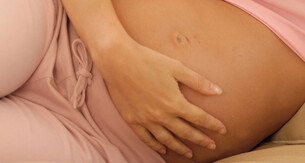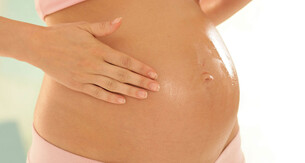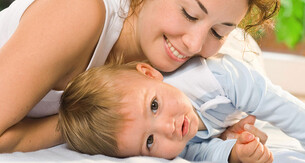The little baby in your belly is now between 3.7 and 4.1 cm in size, weighs about 8 grams and has roughly the same diameter as a lime – still very small, but definitely visible. Over the next few weeks, they’ll quickly get a lot bigger.
Pregnancy weeks:
Week 11 of pregnancy: Your baby’s organs really start to take shape

Size of your baby in week 11
Your baby’s development
What it’s like for the mum-to-be in week 11
Top tips
Questions you may want to ask your doctor or midwife
Size of your baby in week 11

Your baby’s development
Your baby is now beginning the most intensive phase of their growth. Their length is increasing so much that they will almost double in size in the next three weeks.
Week 11 is when your baby’s organs start to develop their complex functions. Their sex-specific organs are also in place and will develop further over the next few weeks, although it’ll take some time before you can tell if you’re expecting a boy or a girl. It’s now becoming increasingly clear whether you are expecting only one child or twins.
The webbing that used to join your baby’s fingers and toes together has now disappeared, and they can now play with their fingers and put their thumb in their mouth. In week 11, they also start to develop their recognisable human features: their ears, which previously were closer to the top of their head, now move down towards the middle, i.e. to where they’re supposed to be.
Cell formation produces the various layers which form their skin and increase its thickness, making it less translucent than before. The roots for their hair develop in the second layer, the dermis, and from week 13, your baby will develop tiny, fine hair called lanugo which will almost completely cover their body and help protect them. Each root also has a sebaceous gland, which produces a fatty, waterproof substance called vernix caseosa. The lanugo helps the vernix caseosa stick to their body, and together they play an important role: they prevent your baby’s delicate skin from becoming too soft in the amniotic fluid, they act as effective thermal insulation, and they offer protection from vibrations, sound and pressure. Your baby will shed this hair towards the end of your pregnancy.
What it’s like for the mum-to-be in week 11
Now you’re in week 11, you’ll hopefully be feeling a lot better. You shouldn’t feel nauseous anymore, and the risk of a miscarriage is now down to a small residual risk, which will put your mind at ease. You might now start thinking about when and how to tell your family and friends the good news, if you haven’t already done so. There’s still no obvious sign of your baby bump, although if this is your second or third pregnancy, you may be able to make out the beginnings of a bump. In any case, you’ll have begun to put on weight as your body builds up its fat reserves. Don’t worry: after the birth, a small amount of sport or exercise and a healthy diet will get rid of the weight you’ve put on, and breastfeeding will also help you get back in shape as your body gets the energy it needs for it from the fat reserves it’s now building up.
Common signs and symptoms
Back pain and abdominal pain
The last weeks of pregnancy can be tough, so you should build up your strength in advance and stay as fit as you can. The pulling sensation in your abdomen may occur every now and again, caused by the growth in your uterus. You might also experience back pain when exercising or when sitting or lying on one side of your body, as your tendons are now more relaxed and flexible to cope with your increased weight. Gentle sports and activities are effective ways to help your body do its job, boost your strength and avoid sore muscles, and there are specific exercises that can relieve the pain of particular symptoms.
Giving birth will be hard work too – it’ll take all the strength, endurance and stamina you’ve got. So physical activity is important during pregnancy! Were you a sporty person before? Then keep it up! * If not, it’s a good idea to start, but don’t overdo it: go for walks, go swimming, do exercises, yoga, etc.
*Consult your gynaecologist or midwife about which sports are suitable and whether it’s a good idea to continue with competitive sport.
Sore breasts
You’ll continue to experience sore, painful breasts (and sensitive nipples) for the next few weeks. These symptoms will ease in the middle months of your pregnancy, as your mammary glands will have developed as much as possible by then. From that point on, your breasts will be ready to fulfil their role when the time comes to breastfeed your baby.
The nutrition pyramid for pregnant and breastfeeding women
The issue of your diet becomes more important during week 11, as you and your baby need more vitamins, minerals and trace minerals. Your doctor and midwife can answer any questions you may have and advise you on the latest scientific dietary recommendations.
The basis of your nutrition as a pregnant woman, i.e. the base of the pyramid, is drinks. Water, unsweetened or lightly sweetened tea, “thin” fruit juice spritzers and vegetable juices are ideal.
The second level of the pyramid, and hugely important for your wellbeing and the healthy development of your baby, is fruit and vegetables, especially pulses. You should eat up to six portions of fruit and vegetables a day – but don’t worry if you can’t manage that every day, as it will be too much for some women.
The third level is carbohydrates, and you should eat five portions of these a day. They include potatoes, bread and grain products, rice and pasta (and wholemeal is absolutely fine whenever you fancy it). This might be too much for you too, so ultimately it’s your decision as to what’s good for you.
The fourth level of the nutrition pyramid for pregnant women is milk and dairy products. The daily recommendation is three portions a day for the first three months. Then from the fourth month, it goes up to four portions a day to meet your body’s increased need for calcium.
The fifth level of the nutrition pyramid is foods which you should only consume in small quantities, including meat and fish as sources of protein. Meat should have as little fat as possible, and the recommendation is no more than twice a week. Never eat raw meat, and make sure it is properly cooked before you eat it in order to avoid consuming any pathogenic bacteria. You can eat fish a bit more often – three times a week is absolutely fine.
Level six is fats such as butter and oils (whereby oils are better for you than butter). One to two tablespoons a day is the recommended daily allowance for fats, and a good way to get that is as part of a mixed salad or when frying food in a pan.
The seventh, and highest, level of the pyramid is luxuries such as sweet and salty food.
Midwife’s advice
Initially, many pregnant women have cravings for salty, hearty food. Don’t worry about it, and tuck in! Your body usually tells you what it needs. These cravings will pass, and then you can focus on eating more healthily.’ Dorothee Kutz, midwife
HiPP has a range of tips and information when it comes to a healthy diet during pregnancy.
Top tips
- Drink 2 litres of fluids a day (as a rule of thumb, one glass for every hour you’re awake).
- Don’t just stick to the same drink to quench your thirst – for instance, try different teas.
- Buy a pregnancy cookbook, which will give you lots of creative ideas and
- recipes for a balanced diet.
- Visit your local market to get fresh fruit and vegetables.
- Think about when you want to tell your loved ones the wonderful news of your pregnancy.
Questions you may want to ask your doctor or midwife
Food allergies
If you have allergies, ask your doctor or midwife about how you can replace the food you can’t eat. Some important nutrients can result in deformities if you don’t consume enough of them. Don’t worry – there’s a healthy alternative for almost all food, and your doctor can refer you to a dietician if necessary.
Information about the author:
Juliane Jacke-Gerlitz is a registered nurse. She has been working in the field of mother and breastfeeding counselling for more than ten years. Currently she is working as a medical writer and psychological consultant. Juliane Jacke-Gerlitz has been married for 22 years, is a mother of eight children and lives with her family in Halle.
Chat with us on Messenger at m.me/hipp.ph




